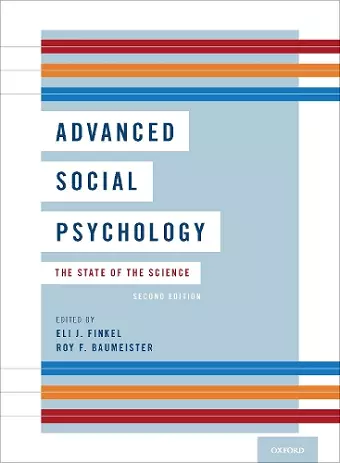Advanced Social Psychology
The State of the Science
Roy F Baumeister editor Eli J Finkel editor
Format:Hardback
Publisher:Oxford University Press Inc
Published:9th May '19
Currently unavailable, and unfortunately no date known when it will be back

Social psychology uses clever, even ingenious, research methods to explore the most essential questions of the human psyche: Why do we help some people and harm others? Why do we pay so much more attention to high-powered people than they pay to us? If humans evolved from great apes, why are human selves so much more elaborate? How does our attachment to our parents when we are infants influence the success or failure of our romantic relationships when we are adults? Can behaving morally "license" us to behave immorally shortly afterward? How do social relationships make us more versus less prone toward physical illness? This volume -- an update to the original, 2010 edition -- provides a graduate-level introduction to social psychology. The target audience consists of first-year graduate students (MA or PhD) in social psychology and related disciplines (marketing, organizational behavior, etc.), although it is also appropriate for upper-level undergraduate courses. The authors are world-renowned leaders on their topic, and they have written state-of-the-art overviews of the discipline's major research domains. The chapters are not only scientifically rigorous, but also accessible and engaging. They convey the joy, excitement, and promise of scientific investigations into human sociality.
Now what do I teach?' is a common refrain among social psychologists taken aback by recent failures to replicate some prominent and classic findings. Updating a social psychology textbook is an unenviable task at a time of substantial uncertainty about theories and findings that seemed almost ordinary in the last edition. Admirably, Editors Finkel and Baumeister aim to address reproducibility directly in this 2nd Edition of Advanced Social Psychology. The first three chapters discuss replicability challenges and reforms to improve rigor and credibility. They also set the stage that science does not have a canon of inarguable facts. Scientific understanding is always in revision, and every finding, claim, and theory is open to confrontation.
The other 18 substantive chapters approach replicability differently. Some highlight replicability success and challenges in their substantive domains; the chapters on Attraction, Morality, Health, and Computation stand out as effective examples. Others appear to address replicability implicitly by what is not said or cited. In those, the self-corrective process of science is working quietly by omission. Finally, a few chapters appear to have missed news of the "reproducibility crisis". These chapters treat each cited claim with the same enthusiastic certainty whether it is backed by a substantial body of evidence or a single paper with just significant effects. This diversity among contributed chapters reflects where we are today as a discipline * still wrestling, from many points of view, with the credibility of the rich theories and findings that comprise social psychology.Brian Nosek, Professor, Department of Psychology, University of Virginia *
ISBN: 9780190635596
Dimensions: 282mm x 224mm x 36mm
Weight: 1588g
600 pages
2nd Revised edition